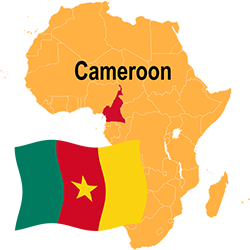 Partners in Douala (Cameroon) worked to strengthen community engagement as part of a multi-city effort, the WHO Urban Governance for Health & Well-being Initiative. Begun in 2021, the initiative aimed to promote health and well-being for all through participation and multi-sectoral collaboration to improve basic services.
Partners in Douala (Cameroon) worked to strengthen community engagement as part of a multi-city effort, the WHO Urban Governance for Health & Well-being Initiative. Begun in 2021, the initiative aimed to promote health and well-being for all through participation and multi-sectoral collaboration to improve basic services.
Partners in Douala used interview questions and key informant interviews (e.g., mayors) to gain an understanding of the situation and to focus the strategies for multisectoral action to be implemented in different municipalities of Douala. They reached out and engaged trusted organizations and networks in a multisectoral platform (e.g., Douala Urban Council, Ministry of Public Health, Minister of the Economy, Planning and Regional Development, Ministry of Women’s Empowerment and the Family, Ministry of Housing and Urban Development).
They worked to improve peoples’ abilities to be involved by creating an environment that fosters full and effective participation; for instance, using the IAP2 Public Participation Spectrum, as a framework for public participation. They communicated the need and benefits of taking action together across sectors. This was guided by the WHO Healthy Cities Framework, and the WHO Health in All Policies’ Four Pillar Model, that recommend using multisectoral action on social determinants to achieve health and health equity.
This Douala initiative developed a multisectoral action platform that enabled collaboration across different levels of government. It strengthened engagement of stakeholders in discussing priority areas and in sharing resources and local knowledge.
[SOURCE: Center for Heath in All Policies Research Translation (2023). WHO Urban Governance for Health & Well-being Initiative, 2021-2028. Phase 1 Case Study Project Report. Douala, Cameroon.]